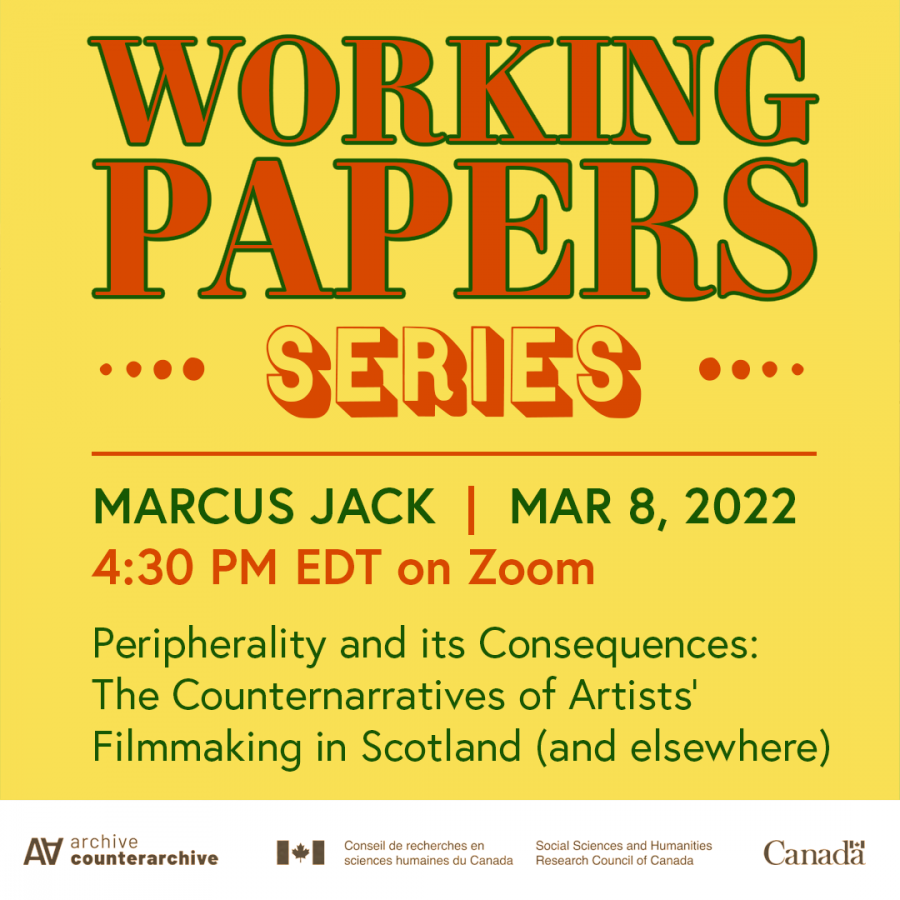March 8, 2022. 4:30PM EST
Free and online
Join us for another online iteration of the Archive/Counter-Archive Working Papers Series, which brings together PhD students from different Universities to hear about exciting doctoral research in the area of archival studies. Our next speaker is Marcus Jack, who is a visiting MITACs doctoral researcher from The Glasgow School of Art. Marcus's talk will be followed by a Q&A with the audience, moderated by our student organizers, Emily Barton and Elisa Arca Jarque.
NOTE: The Zoom link will be emailed to all who register on March 7th.
Peripherality and its Consequences: The Counternarratives of Artists’ Filmmaking in Scotland (and elsewhere)
In the United Kingdom, as elsewhere, the avant-garde film and its progeny have been underwritten by benevolent funding pipelines. Experiments in film and video have never been immune to the machinations of capital, nor, I argue, the marginalisations reproduced therein. The French surrealist filmmaker, feminist and lesbian Germaine Dulac knew this in 1932, when she resolved that: “The cinema is an art and an industry. Considered as art, it must jealously defend its purity of expression and never betray that purity in order to convince. But it is also an industry. To make film and distribute it require money, a lot of money.” In Scotland, a stateless nation and the context of my ongoing doctoral research, recourse to public subsidy for the production of film or video has trailed behind its southern counterpart by the measure of decades. Enduring until at least the 1990s, this discrepancy in cultural policy has, I argue, produced an unwieldy and as yet unreconciled body of filmmaking, peripheral to the organised English avant-garde but which through its strategic negotiation of adverse economies, loopholes and sponsorships has developed a unique character, nimble and resilient. Throwing into question the constitution of artistic movements as purely ideological, the expulsion of work made in Scotland from avant-garde histories—from the ill-categorised too-commercial animation of Norman McLaren to the ekphrastic “documentary” of Lesley Keen and Murray Grigor—asks us to consider by and for whom the language of experimentation is drawn. Drawing from my PhD thesis and research into McLaren as a visiting scholar with Archive/Counter-Archive, this paper uses a materialist basis to advocate for a wholesale rethink of formalist historiography.
Marcus Jack is a curator and writer based in Glasgow, Scotland, currently a visiting UKRI-Mitacs Globalink doctoral researcher at York University, Toronto. He has recently submitted his AHRC-funded PhD thesis, “Artists’ Moving Image in Scotland: Production, Circulation, Reception, 1970–2021,” undertaken at The Glasgow School of Art, and is now investigating the work of Scottish-Canadian animator Norman McLaren via the contexts of his political activism, queer identity and participation in transatlantic programmes of cultural nation-building. Jack is the founding editor of DOWSER (2020–), an open-access publication series concerning artists’ moving image in Scotland, and in 2015 founded Transit Arts as an itinerant platform for the support of artists’ filmmaking, working through public screening programmes and experimental publishing. He has written for the ICA, London; Square Eyes, Vienna; Open City Documentary Festival, London; LUX Scotland, Glasgow; and MAP Magazine, Glasgow.
Please note this talk will have closed captioning.


